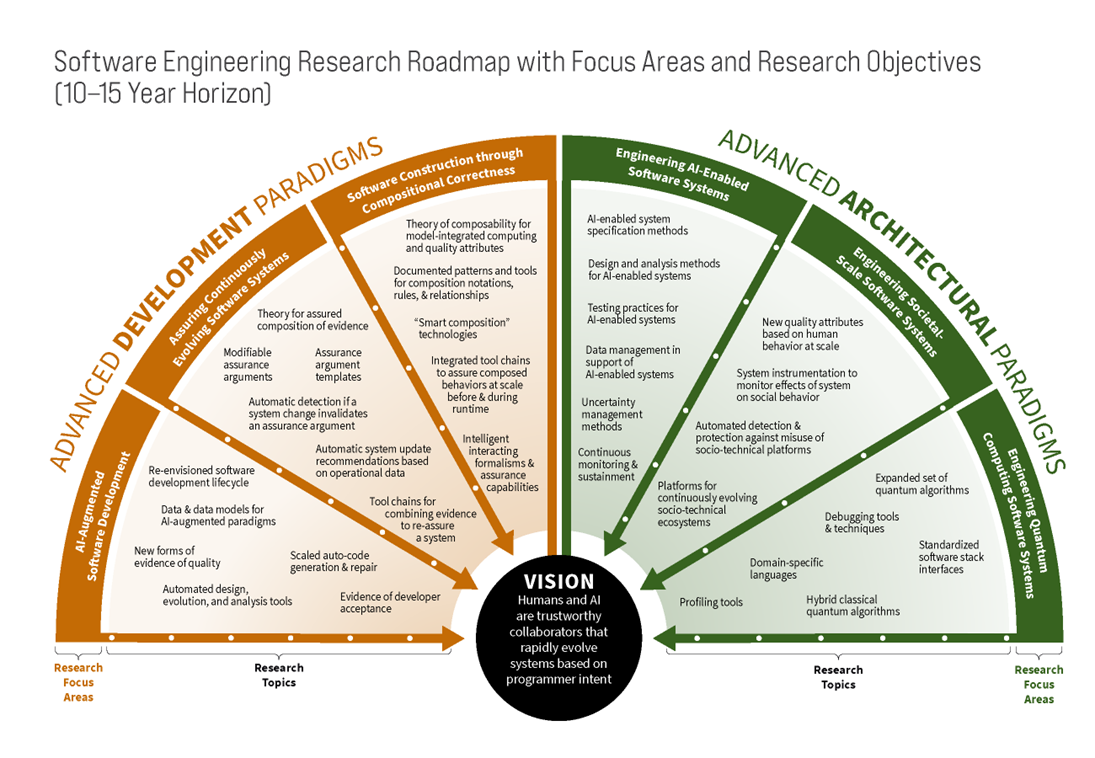Software engineering is a dynamic and exciting field that constantly evolves with new technologies, methodologies and challenges. In this blog post, I will share some of the latest research trends in software engineering that are shaping the future of software development and maintenance.
AI and ML adoption in Software Engineering
One of the most prominent research trends in software engineering is the application of artificial intelligence (AI) and machine learning (ML) to various aspects of software engineering, such as requirements engineering, software design, testing, debugging, evolution and maintenance. AI and ML can help software engineers to automate tedious and error-prone tasks, such as generating test cases, finding bugs, fixing defects, refactoring code, etc. AI and ML can also help software engineers to leverage large amounts of data, such as code repositories, bug reports, user feedback, etc., to gain insights and improve software quality and user satisfaction. Some of the challenges and opportunities in this area include developing novel AI and ML techniques that are tailored to software engineering problems, ensuring the reliability, explainability and ethics of AI and ML solutions, and integrating AI and ML tools into the software engineering workflow. Let's give you some examples:
Measuring DevOps and Agile Implementation in Large / Distributed Scale
Another research trend in software engineering is the adoption of agile and DevOps practices to cope with the increasing complexity, uncertainty and speed of software development. Agile and DevOps are two complementary approaches that aim to deliver software faster, better and cheaper by emphasizing collaboration, communication, feedback and automation. Agile focuses on delivering working software in short iterations with frequent customer involvement, while DevOps focuses on streamlining the software delivery pipeline with continuous integration, delivery and deployment. Some of the challenges and opportunities in this area include measuring and improving agile and DevOps performance, scaling agile and DevOps to large and distributed teams and projects, aligning agile and DevOps with organizational culture and strategy, and incorporating security, privacy and compliance into agile and DevOps processes.
Software Engineering in Modern Computing
A third research trend in software engineering is the emergence of new paradigms and platforms for software development, such as cloud computing, edge computing, blockchain, quantum computing, etc. These paradigms and platforms offer new capabilities and opportunities for software engineering, such as scalability, elasticity, decentralization, security, etc., but also pose new challenges and requirements for software engineering, such as performance, reliability, availability, interoperability, etc. Some of the challenges and opportunities in this area include developing new software engineering methods, techniques and tools that are suitable for these paradigms and platforms, evaluating the trade-offs and benefits of these paradigms and platforms for different types of software systems and applications, and ensuring the compatibility and integration of these paradigms and platforms with existing software engineering practices.
These are just some of the many research trends in software engineering that are currently attracting a lot of attention from researchers and practitioners alike. Software engineering is a vibrant and diverse field that offers many opportunities for innovation and impact. I hope this blog post has sparked your interest and curiosity about some of the latest developments in software engineering research. If you want to learn more about these topics or other related topics, feel free to check out some of the references below or contact me directly. I would love to hear your thoughts and opinions on these research trends or any other topics related to software engineering.

Sources: Software Engineering as a Strategic Advantage: A National Roadmap for the Future (cmu.edu)